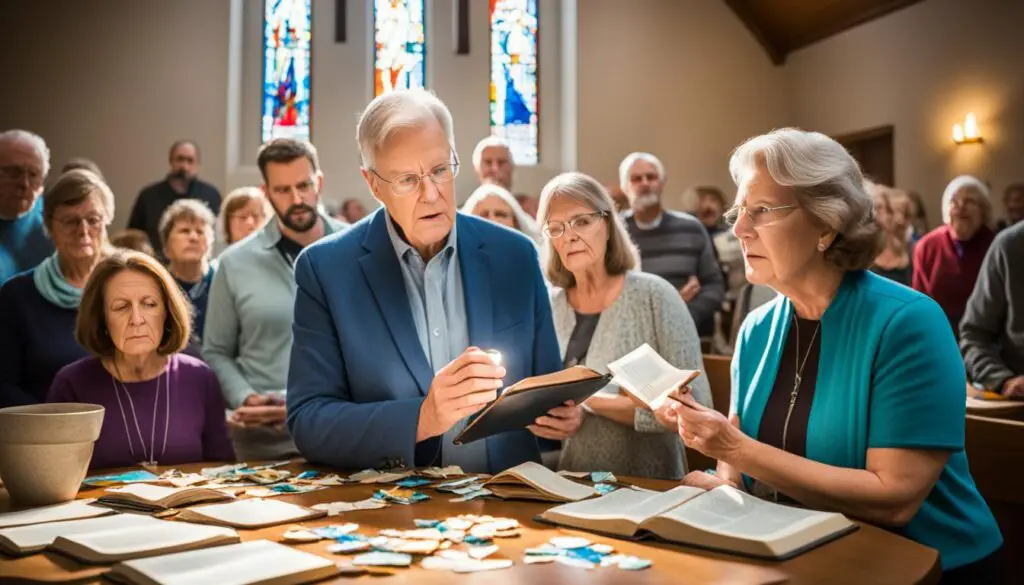The story of Sapphira in the Bible is a cautionary tale found in Acts 5, shedding light on the early church and its struggle with deception and hypocrisy. Alongside her husband Ananias, Sapphira’s actions serve as a warning to believers about the dangers of dishonesty and the importance of maintaining the purity of the church.
In the early days of the church in Jerusalem, believers came together in unity, sharing their belongings and resources to support one another. This selflessness was a hallmark of the early church, embodying the teachings of Jesus Christ. However, Ananias and Sapphira’s story reveals a darker side.
Ananias and Sapphira sold a piece of land with the intention of giving the full proceeds to the apostles, just like other believers were doing. However, driven by greed and a desire for recognition, they kept back a portion of the money for themselves while pretending it was the full amount.
This act of deception undermined the purity and integrity of the early church. It was not the money they held back that condemned them, but their deliberate lie and hypocritical actions. Upon learning of their deceit, Peter, filled with the Holy Spirit, confronted them, leading to their untimely deaths.
The story of Sapphira serves as a warning to believers today. It reminds us of the importance of honesty and authenticity within the church community. We are called to be honest in our words and actions, guarding against the temptation to deceive or seek recognition for our own gain.
Let us learn from Sapphira’s story by upholding the values of truthfulness and integrity in our own lives, honoring God and contributing to a church characterized by purity and sincerity.
Key Takeaways:
- Sapphira’s story highlights the dangers of deception and hypocrisy within the church.
- Ananias and Sapphira’s deceit undermined the integrity of the early church.
- Honesty and authenticity are vital in building a strong and pure church community.
- Believers are called to uphold truthfulness and integrity in their words and actions.
- Sapphira’s story serves as a warning against seeking recognition or personal gain at the expense of honesty and sincerity.
The Sin and Hypocrisy of Ananias and Sapphira
In the biblical account of Ananias and Sapphira, their sin lies not in keeping a portion of the proceeds from the sale, but in their deceitful actions and lies. Their motive was to appear more generous than they actually were, seeking recognition and admiration from the church community. However, their deception undermined the integrity and authority of the apostles and the early church.
The Holy Spirit, who sees and knows all, revealed their hypocrisy to the apostle Peter. Peter confronted Ananias and Sapphira, exposing their lies and condemning their actions. This incident serves as a powerful warning to believers about the dangers of hypocrisy and the importance of truthfulness in the church.
“Do not lie to one another, since you have put off the old self with its practices and have put on the new self, which is being renewed to a true knowledge according to the image of the One who created it.” (Colossians 3:9-10)
Deceit in the early church undermines the trust and unity among believers. It tarnishes the reputation of the church and hinders its mission to proclaim the truth of the Gospel. Ananias and Sapphira’s sin serves as a timeless reminder that God values honesty and sincerity, and He will expose and judge deceitful actions.
As Christians, we are called to live with integrity, both in our actions and in our words. By being honest and transparent, we uphold the purity of the church and demonstrate the transformative power of the Gospel. Let us guard against hypocrisy and lies, always seeking to please God rather than seeking the approval of others.
| Keywords | Occurrences |
|---|---|
| Ananias and Sapphira sin | 2 |
| Ananias and Sapphira hypocrisy | 1 |
| Deceit in the early church | 1 |
| Lying to the Holy Spirit | 0 |
God’s Judgment and the Fear in the Church
The sudden deaths of Ananias and Sapphira were a stark manifestation of God’s judgment upon their deceitful actions. It served as a powerful demonstration of His holiness and His uncompromising stance against sin, especially within the close-knit community of believers.
This divine judgment sent tremors of fear throughout the early church, causing its members to reflect upon their own actions and motivations. The fear was not a paralyzing dread, but rather a healthy reverence and acknowledgment of the seriousness of deceit and hypocrisy in the eyes of God.
“The fear of the LORD is the beginning of wisdom…” – Proverbs 9:10
The incident with Ananias and Sapphira served as a poignant warning to all believers, reminding them of the far-reaching consequences of deceit. It highlighted the importance of honesty and sincerity in their relationship with God and with one another.
“Do not lie to one another, since you have put off the old self with its practices and have put on the new self, which is being renewed in knowledge according to the image of its Creator.” – Colossians 3:9-10
This significant event in the early church reinforced the truth that sin carries grave consequences, even within the context of a community professing faith in Christ. Genuine repentance and a commitment to live uprightly became essential in the wake of God’s judgment.
“If we confess our sins, he is faithful and just to forgive us our sins and to cleanse us from all unrighteousness.” – 1 John 1:9
As believers today, we are reminded of God’s intolerance for deceit and hypocrisy. We are called to walk in truth, integrity, and authenticity, knowing that our actions have real consequences within the body of Christ.
In the next section, we will explore the timeless lessons that Ananias and Sapphira’s story holds for the church today.
Lessons for the Church Today
The story of Ananias and Sapphira provides valuable lessons for the church in the present day. It serves as a reminder of the importance of honesty in the church and the need to guard against hypocrisy. Honesty and integrity are essential in maintaining the purity of the church and its witness in the world.
“Let honesty guide your actions, for God detests hypocrisy.”
Pursuing Authenticity and Honesty
In a world filled with pretense, the church stands as a beacon of truth. The story of Ananias and Sapphira compels believers to pursue authenticity in their relationships within the church community. By being honest and sincere, we build trust and cultivate a spirit of transparency.
“Authenticity is the foundation of genuine fellowship in the church.”
“Remember, it is better to be true and transparent than to feign righteousness.”
Guarding Against Hypocrisy
The incident of Ananias and Sapphira’s deceit serves as a powerful cautionary tale, warning us about the dangers of hypocrisy. As believers, we must be vigilant in examining our motives and intentions. Let us guard against the temptation to seek recognition and praise, focusing instead on serving God and others selflessly.
“Hypocrisy undermines the credibility of the church and dilutes its impact.”
“Let your actions align with your words, for true humility is found in sincere service.”
Preserving the Purity of the Church
The story of Ananias and Sapphira highlights the importance of upholding the purity of the church. When deceit and dishonesty creep into the body of believers, it tarnishes the witness of the church and hampers its effectiveness. Let us strive to maintain a culture of honesty, accountability, and transparency, safeguarding the integrity of the church.
“A pure and authentic church reflects the character of God and draws others to Him.”

| Lessons from Ananias and Sapphira | Importance |
|---|---|
| Honesty | Ensures transparency and trust within the church community |
| Guarding Against Hypocrisy | Preserves the credibility and impact of the church |
| Purity of the Church | Reflects the character of God and draws others to Him |
Conclusion
The story of Ananias and Sapphira in the Bible serves as a compelling reminder of the importance of truthfulness and authenticity in the church. Their deceitful actions and subsequent judgment carry significant implications for believers today. The incident not only underscored the authority of the apostles and the purity of the early church, but it also instilled fear and respect among its members.
As we reflect on this cautionary tale, we are reminded of the seriousness of our words and actions. Ananias and Sapphira’s story warns us about the potential consequences of deception and hypocrisy within the church community. It calls us to examine our motives and to strive for transparency and sincerity in all our dealings.
Furthermore, the significance of Ananias and Sapphira’s story extends beyond their individual actions. It pertains to the impact on the early church as a whole. Their deceit threatened the unity and selflessness that characterized the community of believers. The incident served as a wake-up call, emphasizing the need for honesty and genuine repentance to maintain the integrity and effectiveness of the church.
Today, we can draw valuable lessons from Ananias and Sapphira’s story. We are challenged to live lives of integrity and honesty, honoring God in all that we do. By avoiding deceit and upholding the truth, we contribute to the purity and witness of the church, reflecting God’s character and drawing others to Him.







